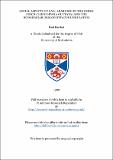Social aspects of call learning in the zebra finch (Taeniopygia guttata) and the budgerigar (Melopsittacus undulatus)
Abstract
Chapter 1 provides an introduction to the thesis by discussing the relevant literature on vocal learning in songbirds and parrots, with particular reference to calls, and setting out the aims of the following chapters. Chapter 2 concerned an investigation of the similarity in the distance calls within and between families of zebra finches, involving fostering young birds to non-related parents. Male offspring were most similar in their distance calls to their male siblings with which they were raised and the adult male which raised them, suggesting an environmental influence in the acquisition of the call. There was also an indication that the call may be, at least in part, inherited. Females were most similar to their mothers and female siblings, though not to the same extent as in males. Chapter 3 examined whether male zebra finches could exhibit vocal plasticity in adulthood, by learning new calls from other conspecifics, and whether social deprivation during a young bird's development would accentuate this tendency. Adult zebra finches could not learn new calls from other similarly raised cagemates, even if these birds were reared under conditions of extreme social deprivation and were presented with an appropriate normally-raised adult male tutor. Chapter 4 described a study which investigated whether adult male budgerigars housed in soundproof boxes, could learn new calls from a tape recording in the absence of any social stimuli. Learning from tapes was very limited with only one bird producing an accurate copy of the playback, emphasising the importance of an interactive social context in vocal learning. Chapter 5 attempted to determine exactly which social factors were most influential in determining the extent of call matching between adult male budgerigars. Certain individuals did match more closely in their contact calls; close proximity appeared to promote call convergence between cagemates. Chapter 6 examined the effect of adding an unfamiliar budgerigar to an established flock, on the group specific call. It was found that, contrary to expectation, mutual imitation by all flock mates did not occur as other studies have shown, and that 'new recruits' conformed to the shared group call. Chapter 7 concluded the findings of the five experimental chapters, and discussed their significance with reference to previous studies, including ideas for further investigation.
Type
Thesis, PhD Doctor of Philosophy
Collections
Items in the St Andrews Research Repository are protected by copyright, with all rights reserved, unless otherwise indicated.

